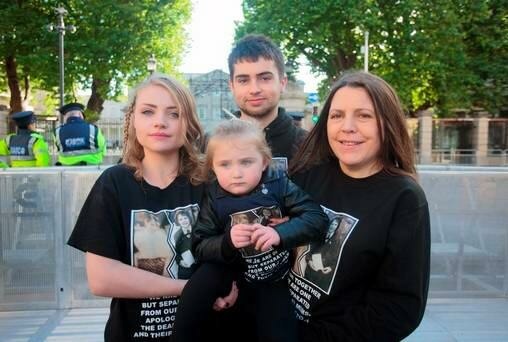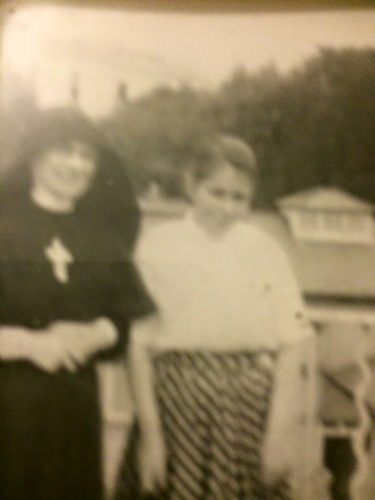"It Came As a Big Shock to Find My Mother Was Being Locked in and Tortured like I Was"
The Journal
It’s understood that at least 1,663 former Magdalene women are buried in Irish cemeteries – many in unmarked graves. In 2013, Taoiseach Enda Kenny apologised to Magdalene women in an emotional speech, saying the laundries “have cast a long shadow over Irish life”. Kenny “apologises unreservedly” to Magdalene women in emotional speech Collins told TheJournal.ie that her mother, an unmarried Traveller woman, was put into a Magdalene laundry, while Collins was put into an industrial school. Collins visited her mother from the age of seven but said she didn’t realise until she was an adult the true extent of what her mother had gone through while at the laundry. Collins said she herself was abused while in the industrial school, leaving her with post-traumatic stress disorder. Stewart and Collins protested outside the Dail and Department of Justice last year to call for justice for the children of Magdalene women, saying they want a full apology from the State and acknowledgement of what the women and children went through. They also say that a full investigation needs to take place around Magdalene mass graves. Angelina’s story Angelina Collins was living in a caravan in Tuam when she was taken and placed into a county home with Mary. Her eldest daughter Margaret – aged 14 – was placed into a laundry. Margaret later took her own life at the age of 27, on Christmas day. Her youngest child Teresa was taken into care and later adopted. Angelina escaped with Mary but after being found, Mary was placed into an industrial school and Angelina into a laundry. Stewart said that records state her grandmother was “a good mum and all the children were healthy”, and believes she was taken into a county home due to being an unmarried Traveller mother. Angelina did not go out and rob a shop and got herself arrested – she was a mother caring for her children. “All it is based on is she didn’t have a ring on her finger and was a Traveller,” said Stewart. Mary Collins said that discovering the true story of the Magdalene women “was a big shock to me – that my mother suffered inside the laundry”. “Growing up they made me hate her,” she said, describe how she was told she was being beaten because of who her mother was. “It came as a big shock to find my mother was being locked in and tortured as I was.” Mary said that she used to be very ashamed of who she is and where she came from, but since her son suffered a serious illness she has realised the importance of heritage and family. “[My son] turned around and said ‘when I’m big I will put flowers on the grave,’ it touched me for the first time that this woman is related to these children.” This kicked off her campaigning on behalf of her mother and women like her. She said that a further shock came when she read the Magdalene Commission Report. “When the report came out I was shocked again because the children were left out of this commission and report,” said Mary. “I feel Ireland has been neglecting the children of these women,” said Laura Stewart, herself the mother of young children. “My mum went over for the Magdalene apology and was hoping they would include the children that were made to visit the laundries and see their mums. Children shouldn’t have been made to go through that. What they had to go through was enough.” “My family history is history that should be put to rest. What they don’t understand is my mum travels over [to Ireland and] it’s all out of her pocket. My mum shouldn’t have to do all those things to gain justice for what happened to her innocent mum.”
Both Stewart and her mother say that the government should look at the Magdalene laundries, mother-and-baby homes and industrial schools together, as they believe they were all connected. “They are wasting more money opening commissions when what you have to do is look at these things as a whole,” said Stewart. Stewart said that the hurt the situation has caused is filtering through the generations of the family. “When I was younger I didn’t understand it and now it’s beginning to affect me,” she said. “It makes me so sad for [my mum] and my family sometimes – I wonder how she feels and how she’s hurting.” She said that she wants the Irish government to “see the hurt and acknowledge it, and they have to because at the end of the day they don’t understand the suffering that these people are going through”. “I want an apology for the children the same way they gave it to the women,” said Mary. “I want the apology. I do want the apology and it would help me because it would be the first time I had been recognised and my mother recognised as an irish citizen.” The pair also hope that by drawing attention to the mass grave, other family members of the women buried there will come forward to claim them. Mass grave Since she found out about her mother’s story, Mary Collins said she hasn’t been able to visit the gravesite. “It made me physically sick and angry thinking about that.” But this year, she has decided it is time to return to her mother’s grave. Thirteen years ago, she had the mass grave at St Finbarr’s cleaned and a single headstone for her mother was placed on it. She knows the forthcoming visit will take an emotional toll. “If I’m totally honest with you I don’t want to be there. I feel I’m being forced to do it. I think it is going to affect me. I don’t want to be there. It just reminds me of all those poor dear ladies I knew [who are buried there].” She wants her mother’s remains to removed from the grave so she can bury her, but said she hasn’t heard back from the order in charge of the grave. She has also been in contact with the police over a woman she says abused her in the home. The woman no longer lives in Ireland. If she ever meets this woman, Collins said she wants to “ask her that question: ‘Why?’ Look at me, I am not dirty.” ‘Somebody has to stand up for these people’
At 18, Mary moved to the UK to work caring for a family’s children. “I was very in on myself,” was how she described her demeanour back then. “I didn’t communicate. I didn’t make friends. I was very deep but I was always the person that cared just for people who suffered.” She was 28 when her mother died at the age of 57. Today, she works with people who have mental health issues, and says that her own experiences help her to have the skills to “fight… for them”. I learned it from life experiences. People that learned it from textbooks, they wonder where I get these skills from but at the end of the day, if you are institutionalised you are able to relate. The memorial service will take place on 27 January at midday in St Finbarr’s Cemetery in Cork. Laura Stewart and Mary Collins run the Justice For All Magdalene Women and Children Facebook page.
|
.
Any original material on these pages is copyright © BishopAccountability.org 2004. Reproduce freely with attribution.


